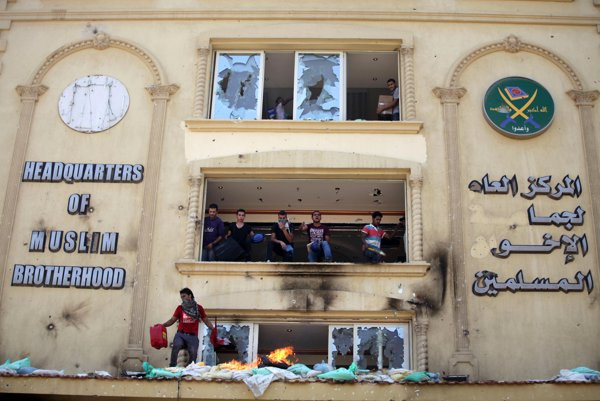Muslim Brotherhood Will Pursue Underground Activities

-It had been expected that following the Arab Spring movement and the downfall of the authoritarian regimes, a democratic system would be established. But considering the social texture of Arab societies, especially Egypt which is the center of the Arab world, this process appeared in another form and that was the victory of the Muslim Brotherhood in the election which was held.
-Religious systems have their own relative components with regard to democratic values including freedom, democracy, human rights, and the rule of law; therefore, this issue led Egyptian society to be faced with a profound double standard.
-This means that the Muslim Brotherhood and their allies, particularly al-Qaeda, on one hand, and the opposition groups that demanded a democratic system, on the other, confronted each other and this gap and contradiction was sometimes intensified and sometimes weakened.
-Morsi attempted to pull the army towards himself by dismissing some of the high-ranking military officers, and apparently he had succeeded to some degree; but with the new wave which was organized against him, the army’s inclination towards him weakened.
-On the other hand, Morsi made a mistake. In a comment, he considered expanded authority for himself and declared this authority with confidence and determination, but was confronted with the people’s negative reaction.
-Under these conditions, Morsi made efforts to take harsh measures; but instead of balancing the situation, it led to its intensification. He later announced his willingness to negotiate, but the opposition stated that they were not willing to negotiate with Morsi.
-Meanwhile, Morsi, under the shadow of the army, was able to survive, thus, the army played a significant role in maintaining the existing situation in Egypt. But following huge protests by the people, the army changed its position and, considering its 48-hour ultimatum, it was clear that sooner or later this coup would happen.
-The Muslim Brotherhood had underground activities for years and during the Nasser era. In the final years of Hosni Mubarak’s presidency, they had, to some extent, gained freedom of action and they had 80 representatives in Egypt’s parliament. In this new era, they had gained power.
-Since the supporters of the Muslim Brotherhood in the Third World pursue terrorist measures, there is the possibility that the Egyptian society would be faced with clashes between the supporters and opponents in the near future.
-Therefore, the Muslim Brotherhood will probably pursue underground activities. Considering the trend that dominates the region and al-Qaeda’s suicide attempts and bombings, there is the possibility that Egypt would be faced with such a situation from within.
-Of course this depends on the ability of the army to effectively control the situation in Egypt and neutralize measures taken by the Muslim Brotherhood and their supporters.
-Uprisings against the authoritarian regimes of the time occurred to achieve an open political atmosphere and the rule of democracy; but the result was different. The reason is that religious systems administer society based on religious principles and values.
-On the other hand, Morsi became proud of his success and attempted to achieve authority beyond the constitution to rule over the country. He gradually tried to spread the values of the Muslim Brotherhood, an act which was confronted with strong reactions from the opposition.
-This coup is the destiny of societies that are not familiar with the culture of democracy.
-In the authoritarian regimes, parties or organized civil societies and even unions are not allowed to be active. The result of this approach is that the masses and society are not familiar with the culture of democracy in a tangible way.
-Therefore, incidents that take place at a certain juncture and movements that appear are often unsuccessful.
-It was predictable that in the Third World either the army should support the government or those who are clever attempt to create a militia (popular armed forces against the existing army) in order to protect themselves against the traditional military reaction; just like, for example, what we saw in Russia during the revolution when Trotsky established the Red Army.
-Liberalism is the axis of democracy. When Fareed Zakaria defines liberalism separately from democracy, he means that the totalitarian regimes also consider themselves to be democratic.
-That is why liberalism is defined separately in the West in order to state that democracy in the West is based on individual freedom, while democracy in the totalitarian regimes is based on collective interests.
-Thus, since two kinds of democracy exist, liberalism is defined independently in the free world in order to make clear that when there is talk of democracy in these countries, its center and axis is liberalism; but in the totalitarian regimes which consider themselves to be democratic, liberalism is not the axis.
-But familiarity of society with the culture of democracy and democratic components is very significant; in the Third World countries, this familiarity has always been periodical and this trend has never been transformed into a norm in the society.
-The reason is that the totalitarian regimes never allow independent parties and organized civil societies and even those people who enjoy popular support to be present in the society.
-That is why when the society is faced with a crisis, the lack of an alternative to manage the society creates concern. Hence, democracy in the Third World countries has always been periodical and the taste of democracy has always turned bitter with a coup and the process has been overturned.

